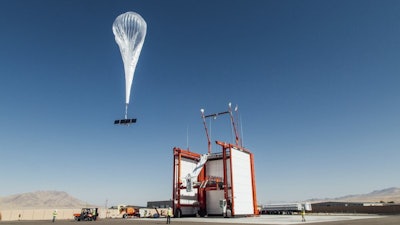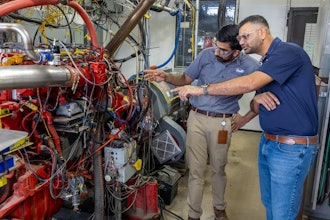
MAPUTO, Mozambique (AP) — Balloons floating 12 miles over northern Mozambique are planned to provide the remote and violence-prone region with stable internet connections, according to Google's parent company, Alphabet, and local mobile telecoms provider Vodacom.
The stratospheric balloons are expected to be over Mozambique in a few months to expand 4G internet coverage to Mozambique's Niassa and Cabo Delgado provinces. Loon, a subsidiary of Alphabet, recently launched similar balloons over parts of rural Kenya.
In recent months, telecoms transmitters in Cabo Delgado have been repeatedly damaged by Islamic extremists, who are waging an insurgency which more than 1,000 people have been killed since 2017.
Extremist attacks this week are blamed for knocking out internet access in parts of Cabo Delgado province.
The northeastern part of Cabo Delgado is where ExxonMobil and France’s Total are developing multi-billion-dollar liquefied natural gas projects. Total’s project is estimated to require investment of $20 billion and Exxon’s nearby project is estimated at $25 billion.
Niassa province is Mozambique’s poorest and is home to a vast wildlife reserve blighted by poaching. Its western border is formed by Lake Malawi.
Loon’s network of floating cell phone towers operating miles (20 kilometers) above Earth will allow Vodacom to expand mobile network access in the two provinces “that have proven hard to cover in the past due to the vast and logistically challenging geographical areas, together with low population density,” said Google and Vodacom in a statement Wednesday.
The balloons will be launched in the United States and will sail on winds in the stratosphere to Africa, according to Loon. When operational over Mozambique the balloons will provide internet service that supports data, voice, SMS and mobile financial services.
The coronavirus pandemic makes it “more important than ever that we find ways to ensure that we expand our coverage and services and that our customers have access to critical hygiene and lifesaving information,” said Vodacom Mozambique Chief Technology Officer Pedro Rabacal.
In the coming months, Loon and Vodacom will work together to continue installing terrestrial infrastructure, which will serve as the physical connection point for Loon’s balloons to Vodacom’s internet and core network. Loon will also begin flying balloons above Mozambique to learn the stratospheric wind patterns on which the balloons must navigate to remain above the service area.
The large balloons will use computers to read winds and geographical location and keep the balloons in place with fans.






















